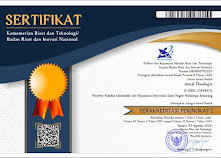collections_bookmark Focus and Scope
Jurnal THEOLOGIA, ISSN: 0853-3857 (p) - 2540-847X (e); is an academic journal published by Faculty of Ushuluddin and Humaniora, Universitas Islam Negeri Walisongo, Semarang, Indonesia.
The focus of Jurnal Theologia is intended to communicate and publish original concepts and research on the subjects. It covers literary (conceptual) and field studies.
Journal Theologia welcomes articles from academicians on theories, philosophy, research, as well as religious practices. In particular, articles that are related to the following topics are invited.
- Islamic Philosophy and Theology
- Qur'anic and Hadith Studies
- Islamic Thought and Philology
- Study of ReligionsÂÂ
- Sufism and Islamic Ethics
- Islam and Peace
- Islam and Gender
- Islam and Local Wisdom
ÂÂ
create_new_folder Section Policies
Articles
device_hub Peer Review Process
Peer Review Process
Articles submitted to the Theologia Journal will be selected and assessed by the Editorial Board to ensure that the manuscript complies with the writing guidelines, focus and scope and is of excellent quality. Articles will be reviewed using the double-blind peer review method, where neither the authors nor the reviewers know each other's identities.
Desk Review. At this stage, the article will be checked by the section editor to ensure that the article meets the guidelines for writing, focus and scope of the journal with excellent quality articles. The author can revise the manuscript according to the criteria if it does not meet the requirements. However, there is also a possibility that the article will be rejected immediately if it does not comply with the writing guidelines.
Peer review. When the manuscript has passed the desk review stage, it will then be submitted to two reviewers who are experts in their fields. The review process will be carried out within two weeks. Manuscripts that do not pass the desk review process will not proceed to this stage.
Reviewer's decision. Reviewers will provide the following recommendations:
- Received; means that the manuscript can be accepted for publication
- Accepted with minor revisions; the article may be accepted for publication after revision in response to the reviewer's concerns.
- Received with major revision; means that substantive deficiencies in the manuscript, such as data analysis, the leading theory used, and paragraph rewriting, need to be revised.
- Rejected; means that the manuscript is not acceptable for publication or that the review given deals with fundamental issues.
The Editorial Board will consider the reviewer's decision to determine the following manuscript process.
Revision Stage. After the article is received with a minor or major revision notation, the article will be returned to the author with a review summary form. For articles accepted with major revisions, authors are given three weeks to revise. In contrast, manuscripts received with minor revisions are given one week for revision. When returning a revised manuscript, authors are required to complete and attach a review summary form.
Final decision. At this stage, the manuscript will be re-evaluated by the Editorial Board to ensure that the author has revised it in response to the reviewers' concerns. In this final decision, the manuscript can still be rejected if the author is not serious about making the necessary revisions.
Proofread. After the manuscript is deemed acceptable by the Editorial Board, it will undergo a proofreading process to maintain linguistic quality.
Confirmation of publication. At this stage, the final layout of the manuscript will be sent back to the author to ensure the contents match the author's writing. At this stage, the author can revise the typographical errors found in the final manuscript. After confirmation from the author is given, the Editorial Secretary will process the manuscript for online publication on the website or in a print publication.
event_note Publication Frequency
THEOLOGIA journal is published twice a year, namely January-June and July-December.
copyright Open Access Policy
This journal provides immediate open access to its content on the principle that making research freely available to the public supports a greater global exchange of knowledge.
unarchive Archiving
This journal utilizes the LOCKSS system to create a distributed archiving system among participating libraries and permits those libraries to create permanent archives of the journal for purposes of preservation and restoration. More...

__.png)